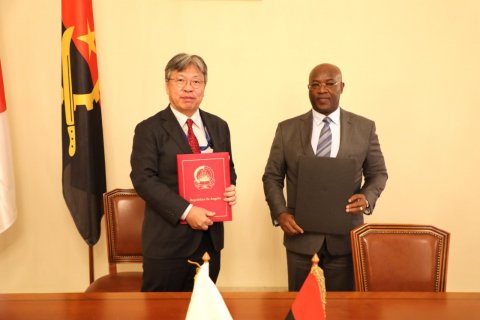"The people who went to work are those who are being threatened, but they are still aware of the strike", said the president of the National Union of Doctors of Angola, Adriano Manuel.
The union leader specified that workers were the target of threats of discounts, implications for career progression and others, but expressed surprise at their participation on the first day of a strike.
"The turnout is very good," he said.
For his part, the general secretary of the Union of Angolan Journalists (SJA), Teixeira Cândido, denounced that Monday's press conference on the strike was not reported by the public media, stating that "there was an express orientation so that it would not be referenced".
For Teixeira Cândido, any omission of the event in the main public media is a violation of a constitutional right, the citizen's right to information.
"This is a matter of public interest, obviously which the media must cover, if the media does not cover it, it is obvious that they are refusing the citizen's right to information", he stressed.
Public Television of Angola in its afternoon newspaper, without mentioning the start of the general workers' strike, heard from a representative of the Ministry of Public Administration, Labor and Social Security (MAPTSS), who assured that 80 percent of the demands had already been met presented by the three main trade unions in the country.
In the news on Rádio Nacional de Angola there was reference to the strike that began this Wednesday and the Government's position, which expresses openness and willingness to continue dialogue with its partners.
Regarding the participation of journalists, he said that in this first phase, professionals from private bodies are providing "maximum coverage" of the strike, but that they should stop in the second stage, scheduled for between the 22nd and 30th of April.
This Wednesday, public employees began the first phase of the general strike called by the three unions, which will last three days.
The three union centrals unanimously approved an interpolated general strike beginning on March 20th and which will take place in three phases, with a first period of three days between March 20th and 22nd, another seven days between April 22nd and 30th and another 11 days between June 3rd and 14th, 2024.
After listening to workers, the Central Geral de Sindicatos Independentes e Livres de Angola (CGSILA), União Nacional dos Trabalhadores Angolanos - Confederação Sindical (UNTA-CS) and Força Sindical - Central Sindical (FS-CS) concluded that the Government did not responded satisfactorily to their demands – increasing the minimum wage, increasing civil service salaries, updating subsidies and reducing taxes – and decided, in a general assembly, to move towards a total strike.
The trade unions began by demanding an increase in the minimum wage from the current 32,000 kwanzas, to 245,000 kwanzas, a proposal made flexible, however, to 100,000 kwanzas, a reduction in the Labor Income Tax to 15 percent and a representative on the Institute's board of directors National Social Security (INSS), "demands" that are said to have been refused by the authorities in six rounds of negotiations.
The trade unions also demand an adjustment to the Civil Service salary, in the order of 250 percent, and a reduction in the Labor Income Tax (IRT) by 10 percent.
The executive decided to propose a minimum wage depending on the size of the company, namely 48,000 kwanzas for small companies, 70,000 kwanzas for medium-sized companies and 96,000 kwanzas for large companies, which was rejected by the unions.







